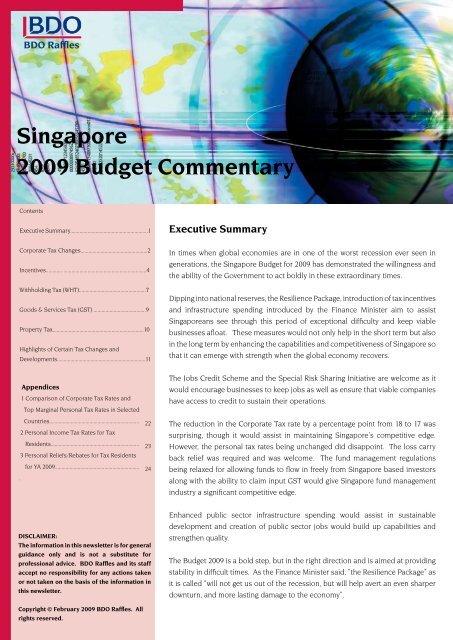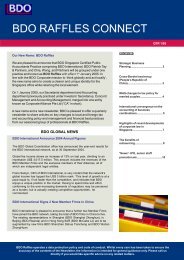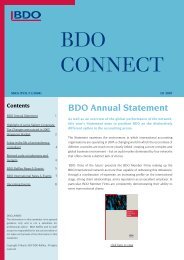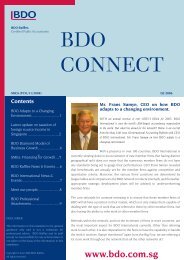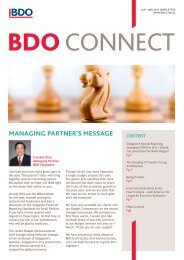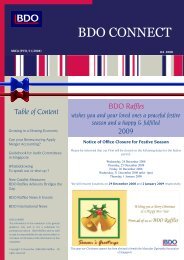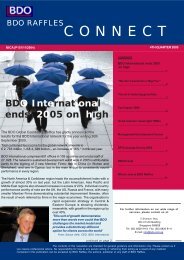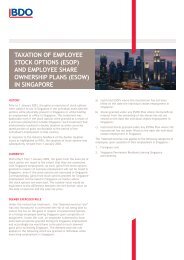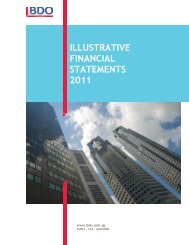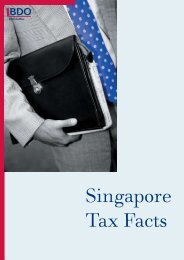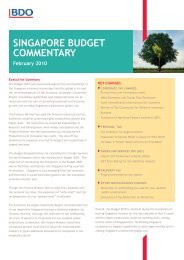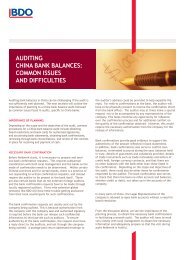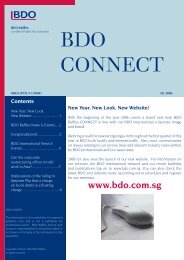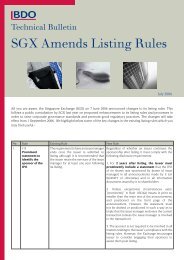Singapore 2009 Budget Commentary - BDO Raffles
Singapore 2009 Budget Commentary - BDO Raffles
Singapore 2009 Budget Commentary - BDO Raffles
Create successful ePaper yourself
Turn your PDF publications into a flip-book with our unique Google optimized e-Paper software.
<strong>BDO</strong> <strong>Raffles</strong><br />
<strong>Singapore</strong><br />
<strong>2009</strong> <strong>Budget</strong> <strong>Commentary</strong><br />
Contents<br />
Executive Summary..........................................................1<br />
Executive Summary<br />
Corporate Tax Changes..................................................2<br />
Incentives............ ..............................................................4<br />
Withholding Tax (WHT)..................................................7<br />
Goods & Services Tax (GST) .......................................9<br />
Property Tax....................................................................10<br />
Highlights of Certain Tax Changes and<br />
Developments..................................................................11<br />
In times when global economies are in one of the worst recession ever seen in<br />
generations, the <strong>Singapore</strong> <strong>Budget</strong> for <strong>2009</strong> has demonstrated the willingness and<br />
the ability of the Government to act boldly in these extraordinary times.<br />
Dipping into national reserves, the Resilience Package, introduction of tax incentives<br />
and infrastructure spending introduced by the Finance Minister aim to assist<br />
<strong>Singapore</strong>ans see through this period of exceptional difficulty and keep viable<br />
businesses afloat. These measures would not only help in the short term but also<br />
in the long term by enhancing the capabilities and competitiveness of <strong>Singapore</strong> so<br />
that it can emerge with strength when the global economy recovers.<br />
Appendices<br />
1 Comparison of Corporate Tax Rates and<br />
Top Marginal Personal Tax Rates in Selected<br />
The Jobs Credit Scheme and the Special Risk Sharing Initiative are welcome as it<br />
would encourage businesses to keep jobs as well as ensure that viable companies<br />
have access to credit to sustain their operations.<br />
Countries...................................................................<br />
2 Personal Income Tax Rates for Tax<br />
Residents..................................................................<br />
3 Personal Reliefs/Rebates for Tax Residents<br />
for YA <strong>2009</strong>...............................................................<br />
.<br />
22<br />
23<br />
24<br />
The reduction in the Corporate Tax rate by a percentage point from 18 to 17 was<br />
surprising, though it would assist in maintaining <strong>Singapore</strong>’s competitive edge.<br />
However, the personal tax rates being unchanged did disappoint. The loss carry<br />
back relief was required and was welcome. The fund management regulations<br />
being relaxed for allowing funds to flow in freely from <strong>Singapore</strong> based investors<br />
along with the ability to claim input GST would give <strong>Singapore</strong> fund management<br />
industry a significant competitive edge.<br />
DISCLAIMER:<br />
The information in this newsletter is for general<br />
guidance only and is not a substitute for<br />
professional advice. <strong>BDO</strong> <strong>Raffles</strong> and its staff<br />
accept no responsibility for any actions taken<br />
or not taken on the basis of the information in<br />
this newsletter.<br />
Enhanced public sector infrastructure spending would assist in sustainable<br />
development and creation of public sector jobs would build up capabilities and<br />
strengthen quality.<br />
The <strong>Budget</strong> <strong>2009</strong> is a bold step, but in the right direction and is aimed at providing<br />
stability in difficult times. As the Finance Minister said, “the Resilience Package” as<br />
it is called “will not get us out of the recession, but will help avert an even sharper<br />
downturn, and more lasting damage to the economy”.<br />
Copyright © February <strong>2009</strong> <strong>BDO</strong> <strong>Raffles</strong>. All<br />
rights reserved.
<strong>Singapore</strong> <strong>Budget</strong> <strong>Commentary</strong> <strong>2009</strong><br />
Corporate Tax Changes<br />
Corporate Tax Rates<br />
As a further step to strengthen <strong>Singapore</strong>’s competitiveness,<br />
the corporate income tax rate will be reduced from 18%<br />
to 17% with effect from Year of Assessment 2010. This<br />
1% corporate income tax rate reduction will mean that a<br />
company with $300,000 of chargeable income will be taxed<br />
at an effective rate of 8.36%.<br />
b. The specified foreign income must have been subject to<br />
tax (i.e tax must have been paid or is to be paid and does<br />
not include deferred tax) in the foreign jurisdiction from<br />
which they were received. The IRAS has clarified that<br />
foreign-sourced income would be considered to have<br />
met the “subject to tax” requirement if the income is<br />
exempted from tax in the foreign jurisdiction as a direct<br />
consequence of that foreign jurisdiction granting a tax<br />
incentive for carrying out substantive business activities<br />
in that jurisdiction; and<br />
The corporate tax rate of 17% will apply to corporates,<br />
trustees (other than trustees of incapacitated persons) and<br />
executors and the computation of the effective company<br />
tax rate for a body of persons.<br />
Please see Appendix 1 on the comparison of corporate<br />
and personal tax rates in selected countries.<br />
It would be good that the Government could also review<br />
the incentive offerings with concessionary tax rates ranging<br />
from 0% to 15%, since the 15% concessionary tax rate will<br />
no longer be an attractive incentive proposition.<br />
With the 3% rate difference between the corporate tax rate<br />
of 17% and the top marginal personal income tax rate of<br />
20%, self-employed individuals may find it more attractive<br />
to corporatise their businesses depending on their level of<br />
income and the additional costs of operating a company.<br />
Expansion of Scope of Foreign-Sourced Income<br />
Exemption (FSIE)<br />
Currently, foreign sourced income of resident nonindividuals<br />
and resident (individual) partners of<br />
partnerships, received or deemed to be received in<br />
<strong>Singapore</strong> is taxable, unless specifically exempt.<br />
Under the FSIE, foreign-sourced dividends, foreign branch<br />
profits and foreign-sourced service income received in<br />
<strong>Singapore</strong> by any resident non-individual or any individual<br />
resident in <strong>Singapore</strong> through a partnership in <strong>Singapore</strong><br />
are exempt from tax provided the following conditions are<br />
met:<br />
a. In the year the income is received in <strong>Singapore</strong>, the<br />
headline tax rate (i.e. the highest corporate tax rate of<br />
the foreign jurisdiction; it need not be the actual rate<br />
of tax imposed on the foreign income) of the foreign<br />
jurisdiction from which the income is received is at least<br />
15%;<br />
c. The IRAS is satisfied that the tax exemption would be<br />
beneficial to the person resident in <strong>Singapore</strong>.<br />
With effect from 22 January <strong>2009</strong>, resident non-individuals<br />
and resident partners of partnerships in <strong>Singapore</strong> will be<br />
exempted from tax on all foreign-sourced income earned<br />
or accrued outside <strong>Singapore</strong> on or before 21 January <strong>2009</strong>,<br />
if they remit their foreign-sourced income to <strong>Singapore</strong><br />
during the period 22 January <strong>2009</strong> to 21 January 2010<br />
(both dates inclusive). In other words, any income that<br />
is currently generated offshore will not get to enjoy this<br />
exemption when remitted to <strong>Singapore</strong>. Hence, taxpayers<br />
should consider appropriate measures to identify and<br />
track their offshore income that accrues from 22 January<br />
<strong>2009</strong>.<br />
In addition, the conditions currently required for the<br />
foreign-sourced income exemption as set under the FSIE<br />
will be temporarily lifted.<br />
The expansion of the scope of foreign-sourced income<br />
exemption would allow the expeditious remittance of<br />
foreign-sourced income to <strong>Singapore</strong> during the one-year<br />
window period to meet the financing needs of business in<br />
<strong>Singapore</strong><br />
The IRAS would release further details by April <strong>2009</strong>.<br />
However, it may be prudent for businesses to wait for<br />
the details of the proposed change to be released before<br />
remitting their foreign-sourced income.<br />
Framework for facilitating Corporate Amalgamations<br />
Generally, in an amalgamation, two or more <strong>Singapore</strong><br />
companies (the amalgamating companies) can amalgamate<br />
and continue as one company (the amalgamated company),<br />
which can be either one of the amalgamating companies<br />
or a new company. On amalgamation, the old companies<br />
cease to exist.
<strong>Singapore</strong> <strong>Budget</strong> <strong>Commentary</strong> <strong>2009</strong><br />
The existing tax position on corporate amalgamations<br />
does not take full consideration of the updated<br />
provisions of the Companies Act governing corporate<br />
amalgamations. Currently, the position taken by the<br />
IRAS on corporate amalgamations is to treat the assets<br />
and liabilities of the transferor to have been disposed of<br />
even though no such transfer has been recognized. As a<br />
result, balancing adjustments need to be made for assets<br />
where capital allowances have been claimed and trade<br />
debts of the amalgamating companies that become bad<br />
or doubtful after the amalgamation cannot be allowed. In<br />
addition, unutilised capital allowances and trade losses<br />
of the amalgamating companies are foregone and the<br />
amalgamated company will not automatically take over<br />
the tax benefits or incentives enjoyed by the amalgamating<br />
company.<br />
While there are certain provisions in the Income Tax Act (ITA)<br />
that allow for the tax free transfers of certain assets between<br />
related companies (Election of Section 24 of the ITA),<br />
the amalgamation between <strong>Singapore</strong> companies would<br />
often result in additional tax costs for the amalgamating<br />
companies such as the deductibility of financing costs and<br />
other costs relating to an amalgamation.<br />
To make it easier for companies to restructure, a new<br />
tax framework for qualifying amalgamations would be<br />
introduced to minimise the tax consequences where<br />
the amalgamated company takes over all the assets<br />
and liabilities of the amalgamating companies and the<br />
amalgamating companies cease to exist. It is hoped<br />
that the proposed tax framework will also address the<br />
abovementioned issues.<br />
The new tax framework would also likely to reduce<br />
tax compliance costs such as to seek advance rulings<br />
from the IRAS on the specific tax treatment of business<br />
combinations and provide greater certainty to taxpayers<br />
under corporate group restructuring.<br />
The IRAS would release details of the new tax framework<br />
for public consultation in February <strong>2009</strong>.<br />
its current year unabsorbed capital allowances and trade<br />
losses (collectively referred to as “qualifying deductions”)<br />
up to S$100,000, to set-off against his assessable income<br />
(or that of his spouse) of the immediate preceding Year<br />
of Assessment (YA). The CBR is subject to meeting the<br />
substantial shareholding test (in the case of a company)<br />
and the same business test.<br />
The CBR system will be temporarily enhanced for the YA<br />
<strong>2009</strong> and 2010 as follows:<br />
a. The maximum amount of qualifying deductions that<br />
may be carried back from each YA will be increased from<br />
S$100,000 to S$200,000;<br />
b. The maximum number of YAs to which the qualifying<br />
deductions may be carried back will be increased from 1<br />
YA to 3 YAs.<br />
For the purpose of carrying back qualifying deductions for<br />
YAs <strong>2009</strong> and 2010, the carry-back is given on due claim<br />
and shall be made in the following order:<br />
a. Firstly, to the third YA immediately preceding the YA of<br />
loss<br />
b. Secondly, where there are qualifying deductions<br />
remaining after (a), the balance will be carried back to<br />
the second YA immediately preceding the YA of loss<br />
c. Finally, where there are qualifying deductions remaining<br />
after (b) above, the balance will be carried back to the YA<br />
immediately preceding the YA of loss.<br />
Where the condition of the same business test is met,<br />
taxpayers may consider accelerating their capital allowance<br />
claims in order to maximise the amount of current year<br />
unutilised capital allowances available for carry back.<br />
To ease businesses’ cash flow in the current economic<br />
downturn, the IRAS will allow provisional claims for the<br />
tax refund to be based on estimated losses (instead of<br />
waiting for the finalization of their chargeable income and<br />
assessments).<br />
Enhancement of Loss Carry Back Relief Scheme<br />
The loss carry-back relief (“CBR”) scheme was first<br />
introduced in YA 2006 with the objective of providing relief<br />
for small businesses to ease their cash flow problems.<br />
Under the current CBR system, any person carrying on<br />
a trade, business, profession or vocation may carry back
<strong>Singapore</strong> <strong>Budget</strong> <strong>Commentary</strong> <strong>2009</strong><br />
Enhancement to existing Capital Allowances Regime<br />
Currently, capital expenditure incurred for plant and<br />
machinery for the purposes of a trade, profession or<br />
business are granted capital allowances write-off of over<br />
3 years.<br />
To ease the burden of businesses in this economic<br />
upheaval period, the Government proposed to lend<br />
support to businesses by accelerating the write down on<br />
the costs of plants and machinery acquired in the basis<br />
periods for the Years of Assessment 2010 and 2011 within<br />
two years as follows:-<br />
• 75% of cost written-off in the first year of acquisition,<br />
with<br />
• The remaining 25% to be written-off in the second year.<br />
This new accelerated capital allowance will reduce the tax<br />
exposure of businesses that are in a tax paying position.<br />
In the case of those who are in a tax loss position, it could<br />
be possible to take advantage of the enhanced loss carry<br />
back relief scheme provided the substantial shareholdings<br />
test and the same business test are complied with<br />
accordingly.<br />
Where only the economic ownership is acquired, approval<br />
has to be obtained from the Economic Development<br />
Board (EDB) for the writing down allowance claim to be<br />
approved.<br />
From 22 January <strong>2009</strong>, the Government proposes to allow<br />
the writing down period for qualifying intellectual property<br />
containing MDE content and which are acquired by MDE<br />
Company to be reduced from the 5-year write off to 2-year<br />
write off. This benefit is available for qualifying IP rights for<br />
MDE content acquired by 31 October, 2013.<br />
However, approval needs to be obtained from EDB for<br />
the accelerated WDA on IP rights for MDE contents for all<br />
instances, even where both economic and legal ownership<br />
of the IP rights for MDE content are acquired.<br />
It is hoped that the concession will assist businesses to<br />
exploit their IP rights from <strong>Singapore</strong> and hence to boost<br />
<strong>Singapore</strong>’s image as an attractive intellectual property<br />
hub.<br />
Enhancement of Tax Deduction for Capital Expenditure<br />
incurred on Renovation and Refurbishment<br />
To assist businesses ease their cash-flow pressures<br />
during the economic downturn, the Government also<br />
proposed a 1-year write-off on the qualified renovation<br />
and refurbishment incurred in the basis periods for the<br />
Years of Assessment 2010 and 2011 instead of the existing<br />
provision of writing off over 3 years. The cap of S$150,000<br />
for every 3 years though remains unchanged.<br />
It is hoped that the enhancement will encourage businesses<br />
to carry out renovation and refurbishment at their business<br />
premises during this year and the next.<br />
Accelerated Writing Down Allowances (WDA) for<br />
acquisition of Intellectual Property (IP) Rights for<br />
Media and Digital Entertainment (MDE) content.<br />
Currently, a 5-year writing down allowance is allowed for<br />
all genres of intellectual property acquired by company or<br />
partnership where both the legal and economic ownership<br />
belong to the respective company or partnership.<br />
Incentives<br />
Enhancement of Fund Management Incentives<br />
Currently, specified income derived by qualifying funds<br />
from designated investments is tax exempt under the<br />
existing fund management tax incentives. A qualifying<br />
fund can be in the form of companies, trusts or individual<br />
accounts.<br />
Currently, where a qualifying fund is in the form of a<br />
company or a trust, the qualifying fund must not be 100%
<strong>Singapore</strong> <strong>Budget</strong> <strong>Commentary</strong> <strong>2009</strong><br />
beneficially owned by resident investors. In addition,<br />
resident non-individual investors of a qualifying fund are<br />
subject to a 30% or 50% investment limit, as the case may<br />
be depending on the number of investors in the fund. A<br />
breach of this limit would subject resident non-individual<br />
investors to a financial penalty.<br />
Moreover, under the existing tax incentives, where the fund<br />
vehicle is a Limited Partnership, the incentive conditions<br />
are to be applied on each partner, to determine if they<br />
qualify for the tax incentives.<br />
Based on the existing incentives, resident corporates are<br />
inadvertently discouraged from having funds managed<br />
from <strong>Singapore</strong>. Hence, a New Enhanced Tier will be<br />
introduced to reinforce <strong>Singapore</strong>’s position as a leading<br />
Asian hub in the Fund management business.<br />
This Enhanced Tier will be applicable to the existing fund<br />
management incentives for funds with a minimum fund<br />
size of S$50 million at the point of application amongst<br />
other conditions, with effect from 1 April <strong>2009</strong> to 31 March<br />
2014 (both dates inclusive). Under the Enhanced Tier,<br />
there will be no restrictions imposed on the residency<br />
status of the fund vehicles as well as that of investors. The<br />
Enhanced Tier will also apply to funds that are constituted<br />
in the form of Limited Partnerships i.e. there will no longer<br />
be a need to look through to the partners’ level to apply<br />
the incentive conditions. The 30% or 50% investment limit<br />
imposed on resident non-individual investors will also be<br />
lifted for funds that come under the Enhanced Tier.<br />
Fund managers interested in the Enhanced Tier for their<br />
funds may apply to MAS for approval.<br />
A sunset clause will also be introduced for the Enhanced<br />
Tier as well as the existing fund management incentives<br />
at the incentive scheme level. Both incentives will expire<br />
on 31 March 2014. All funds that are on the scheme on<br />
or before 31 March 2014 will continue to enjoy the tax<br />
exemption after 31 March 2014, subject to them continuing<br />
to meet the scheme conditions.<br />
The above proposed scheme would make it easier for fund<br />
managers in <strong>Singapore</strong> to reach out to resident corporates<br />
for their pool of funds to be managed from <strong>Singapore</strong><br />
since resident corporates will enjoy the benefits fully from<br />
the tax exemption on qualifying income derived by the<br />
qualifying funds which they have invested in. However, as<br />
the enhanced tier only applies to fund size of S$50 million,<br />
we may see more boutique fund managers come together<br />
to raise funds on a consolidated basis to meet the minimum<br />
fund requirement. The above move is indeed a significant<br />
step, in particular, the inclusion of Limited Partnership in<br />
the fund management scheme, in increasing <strong>Singapore</strong>’s<br />
competitiveness with other fund management centres<br />
around the world.<br />
MAS will be releasing details of the scheme by April <strong>2009</strong><br />
Enhancement of Specified Income and Designated<br />
Investment Lists<br />
‘Specified income’ derived from ‘designated investments’<br />
enjoys tax exemption. The Government has in prior years,<br />
taken feedback from the industry and expanded the list. In<br />
this year’s budget, the Government again has expanded<br />
the list and the expanded list will apply to all funds and not<br />
just for those holding Enhanced Tier status.<br />
With effect from 22 January <strong>2009</strong>, the following 2 lists have<br />
been expanded as follows:<br />
The list of ‘specified income’:<br />
• Income realized (other than through sale) on or after<br />
22 January <strong>2009</strong> from designated investments in other<br />
forms (held to maturity, redemption, or where the<br />
realization leads to a transfer of both economic and<br />
legal ownership).<br />
• Certain income derived from debt securities under the<br />
Qualifying Debt Securities (QDS) scheme, specifically:<br />
(i) Prescribed income directly attributable to QDS<br />
issued on or after such date as may be prescribed<br />
by regulations;<br />
(ii) Amount payable on any Islamic debt securities<br />
which are QDS issued on or after 22 January <strong>2009</strong>.<br />
The list of ‘designated investments’:<br />
• Investments in structured products<br />
• Units in business trusts<br />
• Qualifying Islamic investments involving the Murabaha,<br />
Mudaraba, Ijara wa lgtina, Musharaka, Istisna and Salam<br />
concepts<br />
• Emissions derivatives<br />
• Stocks and shares of unlisted companies (regardless of<br />
residency status) denominated in any currency<br />
• Adjudicated and non-adjudicated liquidation claims
<strong>Singapore</strong> <strong>Budget</strong> <strong>Commentary</strong> <strong>2009</strong><br />
The expansion of the list is welcome and should assist<br />
<strong>Singapore</strong> in leveraging on the growth areas of Islamic<br />
investment products in Asia and environment related<br />
products. MAS will be releasing details by April <strong>2009</strong>.<br />
Enhancements of Financial Sector Incentive-<br />
Headquarter Services (FSI-HQ) scheme<br />
Currently, the FSI-HQ scheme grants a 10% concessionary<br />
tax rate to a FSI-HQ company on qualifying income derived<br />
from providing qualifying services to qualifying network<br />
companies.<br />
A company cannot be approved as an FSI company if:<br />
(a) It is not licensed or approved by MAS or is exempted<br />
from such licensing or approval under any Act; and<br />
(b) It provides treasury, investment or financial services<br />
in <strong>Singapore</strong> to any of its offices or its associated<br />
companies.<br />
The tax concession under the FSI-HQ scheme does not<br />
extend to income from qualifying services to Local Network<br />
Companies (LNC).<br />
Separately, there is a tax incentive scheme for provision of<br />
high value-added processing services (hereafter referred<br />
to as the Qualifying Processing Services Company (QPC)<br />
scheme), which grants a 5% concessionary tax rate on<br />
income derived from providing prescribed processing<br />
services in <strong>Singapore</strong> to any financial institution or another<br />
QPC. This incentive is valid for the period from 27 February<br />
2004 to 26 February <strong>2009</strong>.<br />
To encourage financial institutions to manage and control<br />
their regional / global operations from <strong>Singapore</strong>, the FSI-<br />
HQ scheme will be enhanced for the period of 22 January<br />
<strong>2009</strong> to 31 December 2013 (both dates inclusive).<br />
The enhancements are as follow:<br />
(a) To extend the above scheme to a company that:-<br />
(i) is wholly-owned, directly or indirectly by, or wholly<br />
owns directly or indirectly, a company that is licensed<br />
or approved by MAS or by the financial supervisory<br />
authority in its home country; and<br />
(b) Withholding tax (WHT) exemption will be granted<br />
on interest payments made by a FSI-HQ company<br />
to qualifying persons on qualifying loans entered<br />
into during the period from 22 January <strong>2009</strong> to 31<br />
December 2013 (both dates inclusive) to perform<br />
qualifying activities.<br />
(c) An LNC can be approved as a qualifying network<br />
company of a FSI-HQ company, subject to conditions.<br />
(d) The activities incentivised under the QPC scheme will<br />
be folded under the FSI-HQ scheme and income from<br />
providing prescribed processing services in <strong>Singapore</strong><br />
to any financial institution or another QPC will be taxed<br />
at a concessionary rate of 10%. There will be no other<br />
changes to the scope of the QPC scheme. Companies<br />
that have been approved during the period from 27<br />
February 2004 to 26 February <strong>2009</strong> will continue to<br />
enjoy the concessionary rate of 5% until the end of<br />
their respective awards.<br />
The above proposed enhancement indicates the<br />
Government’s commitment to promote <strong>Singapore</strong>’s<br />
financial sector and to attract global firms to base their<br />
headquarters in <strong>Singapore</strong> in this extraordinary difficult<br />
times. MAS will be releasing details of the scheme by April<br />
<strong>2009</strong>.<br />
Extension and Enhancement of Commodity<br />
Derivatives Trader (CDT) Scheme<br />
The current CDT Scheme which is due to expire on 26<br />
February <strong>2009</strong>, grants a 5% concessionary tax rate on<br />
income derived by an approved standard/ enhanced<br />
commodity derivatives trading company from:<br />
(i) trading in over-the–counter/ exchange-traded<br />
commodity derivatives or freight derivatives;<br />
(ii) services as an intermediary in connection with<br />
transactions relating to over-the-counter / exchangetraded<br />
commodity derivatives or freight derivatives.<br />
Enhancements which will strengthen the Government’s<br />
initiative to develop <strong>Singapore</strong> as a major hub for<br />
commodity trading will be made to the current scheme<br />
with effect from 27 February <strong>2009</strong>.<br />
(ii) provides treasury, investment or financial services<br />
in <strong>Singapore</strong> for any of its offices or its associated<br />
companies.
<strong>Singapore</strong> <strong>Budget</strong> <strong>Commentary</strong> <strong>2009</strong><br />
The enhancements are as follows:<br />
• To fold the CDT Scheme into a new sub-category within<br />
the FSI-Derivatives Market (FSI-DM) Scheme for an<br />
extension till 31 December 2013.<br />
• To include ‘emission derivatives’ under the FSI-DM (CDT)<br />
award in the definition of commodity derivatives (apply<br />
to trades entered into during the period of 27 February<br />
<strong>2009</strong> to 31 December 2013.)<br />
• To remove counterparty restrictions under the FSI-DM<br />
(CDT) award (apply to trades entered into during the<br />
period of 27 February <strong>2009</strong> to 31 December 2013).<br />
The above counterparty relaxation for qualifying trades<br />
will also apply to qualifying trades carried out under the<br />
Global Trader Programme (GTP) which is entered into<br />
during the period of 27 February <strong>2009</strong> to 31 December<br />
2013. This is logical as GTP traders will also be engaging in<br />
such trades too.<br />
The proposed enhancement eases the administrative<br />
burden in tax compliance and allows flexibility in trades<br />
as the concession is not confined to a defined group of<br />
persons.<br />
Withholding Tax (WHT)<br />
Extension and enhancement of WHT exemption for<br />
maritime industry<br />
Generally, interest payments to a non-resident would<br />
be subject to <strong>Singapore</strong> withholding tax at a rate of 15%<br />
unless exemption or a reduced rate of withholding tax is<br />
available under a relevant tax treaty.<br />
However, under the Block Transfer Scheme (BTS), WHT<br />
exemption can be granted to interest payable on a loan<br />
taken by a shipping enterprise from a lender outside<br />
<strong>Singapore</strong> to acquire a <strong>Singapore</strong>-flagged ship that is<br />
registered with the <strong>Singapore</strong> Registry of Ships (SRS) on<br />
any date from 1 November 2003 to 31 December 2008<br />
(both dates inclusive).<br />
The WHT exemption under BTS has been extended for<br />
another 5 years to 31 December 2013. Additionally, the<br />
WHT exemption under the BTS would be extended to<br />
interest payments on loans taken by a shipping enterprise<br />
from a lender outside <strong>Singapore</strong> to acquire 100% of the<br />
shares in a Special Purpose Vehicle with a wholly owned<br />
<strong>Singapore</strong> flagged vessel registered from 1 January <strong>2009</strong><br />
to 31 December 2013.<br />
MAS will be releasing details by April <strong>2009</strong>.<br />
Enhancement of the Financial Sector Incentive<br />
– Headquarter Services (FSI-HQ) scheme<br />
The Minister has announced that WHT exemption will be<br />
granted to interest payments made by a FSI-HQ company<br />
on qualifying loans entered into during the period from 22<br />
January <strong>2009</strong> to 31 December 2013 (both dates inclusive)<br />
to perform qualifying activities.<br />
Personal Income Tax Rebate<br />
Though, highly anticipated, there was no change in the<br />
personal tax rates. One would have anticipated that a<br />
lowering of the tax rate would have increased “cash in the<br />
pocket”, but we will have to maybe wait for another year or<br />
so to see if there is any alignment of corporate and personal<br />
tax rates. Nevertheless, the Government has proposed to<br />
maintain the income tax rebate of 20% for all resident<br />
taxpayers for Year of Assessment <strong>2009</strong> to help cushion the<br />
effects of the economic downturn on individuals. This is<br />
however subject to an overall cap of S$2,000.
<strong>Singapore</strong> <strong>Budget</strong> <strong>Commentary</strong> <strong>2009</strong><br />
The 20% tax rebate is calculated based on the tax payable<br />
after double taxation relief (DTR) and other credits but<br />
before set-off of the Parenthood Tax Rebate.<br />
Please refer to the following Appendices:-<br />
Appendix 2 on the Personal Income Tax Rates for Year of<br />
Assessment <strong>2009</strong>.<br />
Appendix 3 for the Personal Reliefs/Rebates for Tax<br />
Residents for Year of Assessment <strong>2009</strong>.<br />
Installment Option for Personal Income Tax Payment<br />
Currently, tax resident individuals may elect to pay their<br />
personal income taxes in interest-free monthly installments<br />
of up to 12 months, subject to the approval of the IRAS.<br />
The 12 monthly installment cycle starts in May and ends in<br />
April of the following year.<br />
To help ease the cash burden of tax resident individuals<br />
who may have lost their jobs in 2008 or likely to lose in<br />
<strong>2009</strong>, the Finance Minister has proposed to allow such<br />
individuals to approach IRAS to re-work their installment<br />
plans (up to a maximum of 24 month installments) for tax<br />
assessed in Year of Assessment <strong>2009</strong>.<br />
Property Tax Rebate for Owner-Occupied Residential<br />
Properties<br />
Removal of Income Tax on Net Annual Value (NAV)<br />
Currently, the NAV of a property is taxable if it is used by the<br />
owner or on behalf of the owner for residential purposes,<br />
and not for the purpose of producing profit (business<br />
purpose) in <strong>Singapore</strong>. However, an annual exemption of<br />
up to S$150,000 is granted in respect of a single property<br />
occupied by the owner. The exemption does not apply in<br />
the case of another person occupying the property on<br />
behalf of the owner. With effect from Year of Assessment<br />
2010, the income tax on the NAV is to be removed. This<br />
will benefit property owners who are paying income tax on<br />
NAV while not collecting any profit from the occupation of<br />
their residential property.<br />
Enhancement of Tax Deduction on Donations<br />
To promote the spirit of philanthropy in individuals<br />
and corporations, particularly in the current economic<br />
downturn where voluntary organizations face difficulties in<br />
raising funds, the Government has decided to enhance tax<br />
deduction on all donations made to Institutions of a Public<br />
Character and other approved beneficiaries between 1<br />
January <strong>2009</strong> and 31 December <strong>2009</strong> (both dates inclusive)<br />
to 250%. All existing rules to qualify for the enhanced tax<br />
deduction will remain the same.<br />
Enhancement of Start-Up Exemption Scheme<br />
Currently, owner-occupied residential properties enjoy two<br />
property tax rebates:<br />
(a) the concessionary property tax rate of 4% per annum<br />
together with the GST rebates (based on the annual<br />
value of their properties) ranging from S$25 to S$150<br />
per annum.<br />
(b) The additional property tax rebate of up to S$100<br />
(or the property tax amount after deducting the GST<br />
rebate, whichever is lower) per year for 2008 and <strong>2009</strong><br />
as part of the 2007 GST Offset Package.<br />
In order to encourage social entrepreneurship in <strong>Singapore</strong><br />
and to recognize their contribution, the Finance Minister<br />
has extended the exemption for start-up companies<br />
limited by guarantee, subject to certain conditions. As a<br />
result, social enterprises can claim a tax exemption for the<br />
first three years of assessment upon incorporation:-<br />
a. Tax exemption on the first S$100,000 of normal<br />
chargeable income; and<br />
b. Tax exemption on 50% of the next S$200,000 of normal<br />
chargeable income.<br />
In order to ease household expenses in the economic<br />
downturn, the Government has proposed a one-off<br />
40% property tax rebate for owner-occupied residential<br />
properties for calendar year <strong>2009</strong><br />
The maximum exemption is S$200,000 per annum.
<strong>Singapore</strong> <strong>Budget</strong> <strong>Commentary</strong> <strong>2009</strong><br />
Goods and Services Tax (GST)<br />
No Change in GST Rate<br />
As expected, there was no cut in the GST rate of 7%. As<br />
mentioned by the Finance Minister, GST has allowed<br />
<strong>Singapore</strong> to put in place major social supports and given<br />
<strong>Singapore</strong> a stable revenue base. Hence, it will not be a<br />
surprise if the GST rate increases in the future once the<br />
economy recovers from the current recession, as the rate<br />
of 7% is still considered low compared to other countries.<br />
Zero-rating and New Special Import Relief Scheme<br />
for the Aerospace Industry<br />
To further enhance the competitiveness of the aerospace<br />
industry, the Minister has expanded the scope of GST<br />
zero-rating for the industry and introduced a new scheme<br />
whereby GST is suspended for the import of qualifying<br />
aircraft components and systems.<br />
The current zero-rating provisions for aircraft do not<br />
apply to aircraft used or intended for use for recreation<br />
or pleasure. Unlike ships where the Act excludes ships<br />
that are ‘designed or adapted for use for recreation or<br />
pleasure’, the focus on aircraft is on the actual usage.<br />
With effect from 1 April <strong>2009</strong>, the following changes will be<br />
introduced:<br />
a) The zero-rating provisions would include aircrafts<br />
that are wholly used or intended to be wholly used for<br />
international transportation of goods and passengers,<br />
including private aircraft. There will be no more distinction<br />
whether the transportation of goods or passengers is<br />
for business or pleasure on the condition that the end<br />
destination is outside <strong>Singapore</strong>.<br />
b) The zero-rating would include the sale, maintenance<br />
and repair services of aircraft components or systems.<br />
c) A New Scheme will also be introduced to facilitate the<br />
import of aircraft components or systems without the<br />
payment of GST.<br />
The above changes will help to improve the cash flow<br />
position and to ease the GST compliance burden of the<br />
businesses. This proposed measure will boost the growing<br />
Aerospace industry in <strong>Singapore</strong>.<br />
Details will be released by IRAS by March <strong>2009</strong>.<br />
Suspension of GST and Duty on Goods Temporarily<br />
Removed from Zero-GST or Licensed Warehouse for<br />
Auctions and Exhibitions<br />
Currently, GST and Excise duty is payable when goods are<br />
removed from a Zero-GST or Licensed warehouse. From<br />
1 April <strong>2009</strong>, GST and Excise duty will be suspended on<br />
goods (including wine) temporarily removed from a Zero-<br />
GST or Licensed warehouse for auctions or exhibitions.<br />
The intention is to encourage the growth of the auction and<br />
exhibition industry as well as specialised storage facilities<br />
in <strong>Singapore</strong>. These specialised storage facilities can store<br />
goods with GST and Customs duties suspended up to the<br />
time when they are sold. This would ease the cash flow<br />
of businesses, especially when the goods are temporarily<br />
removed for such events.<br />
Details will be released by <strong>Singapore</strong> Customs by March<br />
<strong>2009</strong>.<br />
Exemption of Duty and GST for a Specified Quantity of<br />
Wine for Approved Wine Exhibitions and Conference<br />
events<br />
Currently, Excise duty and GST are payable for wine sold<br />
at any retail outlet in <strong>Singapore</strong>, including displays at wine<br />
exhibitions. From 1 April <strong>2009</strong>, Excise duty and GST will<br />
be exempted for a specified quantity of wine for use at<br />
approved wine exhibitions and conferences.<br />
Each exhibitor and main conference organiser would enjoy<br />
duty exemption and GST relief on up to 3 bottles of wine<br />
per label per day.<br />
It is clear that this is intended to promote wine trading<br />
activities, develop the wine industry and the consumption<br />
of wine in <strong>Singapore</strong>. It would also directly reduce the cost<br />
of importing wine for exhibition and conference events,<br />
especially for small businesses that are not GST registered.<br />
However, the limitation of 3 bottles of wine would create<br />
additional administrative work for exhibitors who have to<br />
keep documentary evidence to support the exemption.<br />
Exhibitors may also limit the number of bottles for wine<br />
tasting especially for popular wines and customers may be<br />
disappointed if samples are not available for tasting.<br />
Details will be released by the <strong>Singapore</strong> Customs by<br />
March <strong>2009</strong>.
<strong>Singapore</strong> <strong>Budget</strong> <strong>Commentary</strong> <strong>2009</strong><br />
Recovery of Input GST for Qualifying Funds<br />
Property Tax<br />
Currently, services provided to a fund outside <strong>Singapore</strong><br />
generally qualify for zero-rating whereas services provided<br />
to a fund in <strong>Singapore</strong> are standard-rated. Funds dealing<br />
primarily with exempt supplies are not GST registered and<br />
would incur irrecoverable GST on their expenses. Banks<br />
also make substantial exempt supplies and have been<br />
given the concession of applying a fixed input tax recovery<br />
rate that greatly eases the burden of identifying whether<br />
the input tax is incurred in the course of making a taxable<br />
supply.<br />
To promote the fund management industry in <strong>Singapore</strong><br />
for the period 22 January <strong>2009</strong> to 31 March 2014 (both<br />
dates inclusive), qualifying funds that are managed by a<br />
prescribed fund manager in <strong>Singapore</strong> will be allowed<br />
to claim a substantial portion of the GST incurred on<br />
prescribed expenses.<br />
The input tax claim process would be by way of Ministerial<br />
remission. That means, these funds need not apply for<br />
GST registration and comply with the obligations under<br />
the GST Act. This would greatly reduce the administrative<br />
and compliance cost for approved funds.<br />
Details will be released by MAS by April <strong>2009</strong>.<br />
A property tax rebate of 40% will be given to industrial<br />
and commercial properties for <strong>2009</strong>. Property owners and<br />
landlords are urged not only to pass on this benefit to<br />
their tenants but also to consider further in adjusting their<br />
rentals terms.<br />
The property tax rebate is also extended to land which<br />
is approved for development. The deferral period is for<br />
a maximum of two years, effective 22 January <strong>2009</strong> until<br />
21 January 2011 or the TOP date of the development,<br />
whichever is earlier. For private residential projects, a oneyear<br />
extension period of the project completion is now<br />
allowed. The period given to developers with qualifying<br />
certificates to dispose of all residential units in their<br />
developments will be extended from two to four years.<br />
In addition, developers are allowed to rent out unsold<br />
residential units during this period. Government sale sites<br />
and private land owned by foreign developers are also<br />
allowed for re-assignment.<br />
Meanwhile, the property tax assessment rate for hotel<br />
rooms will remain at 20% for <strong>2009</strong>.<br />
The property tax rebate and measures in relaxing the period<br />
of completion of projects will help developers in their cash<br />
flow and to hold back their developments that they had<br />
originally planned in the current economic crisis.<br />
10
<strong>Singapore</strong> <strong>Budget</strong> <strong>Commentary</strong> <strong>2009</strong><br />
HIGHLIGHTS OF CERTAIN TAX CHANGES AND DEVELOPMENTS<br />
Description<br />
Determination of the Date<br />
of Commencement of<br />
Business<br />
Key Features<br />
Currently, under the IRAS circular “Concession for Enterprise<br />
Development – Tax Deduction Allowable for Certain Expenses<br />
Incurred Prior to Commencement of Business” dated 14 March<br />
2003, any person who carries on a business will be treated as<br />
having commenced its operation on the first day of the accounting<br />
year in which it earns its first dollars of business. All outgoings and<br />
expenses incurred prior to the date on which a business commences<br />
operation are not wholly and exclusively incurred in the production<br />
of income. Such pre-commencement or pre-operating expenses are<br />
not allowable for tax purposes. However, certain business may have<br />
commenced operation before the first dollar of business receipt is<br />
earned.<br />
12 December 2008<br />
In this respect, the Comptroller of Income Tax (“CIT”) has now issued<br />
a new circular “Determination of the Date of Commencement of<br />
Business” on 12 December 2008. The CIT has stated that the primary<br />
tax considerations to determine whether a business has commenced<br />
its operation are to ascertain the actual regular activities carried on<br />
by a business and the presence of the profit-making structure of the<br />
business that enable it to commence its day-to-day operation.<br />
The CIT generally requires the following facts for examination in<br />
determining the date of commencement:-<br />
Nature of business<br />
Wholesale and retail<br />
Manufacturing<br />
Hoteliers<br />
Property Developer<br />
Date of commencement<br />
Date of the business opened to the<br />
public<br />
Date of commercial production of the<br />
goods<br />
Date of obtaining certificate of hotel<br />
registration<br />
Date of acquiring the land/<br />
building for development for sale<br />
Proprietary club<br />
Professional services<br />
Date of launching its club membership<br />
Date when the business is ready to market<br />
its services and conclude contracts<br />
with its potential clients<br />
11
Highlights Of Certain Tax Changes And Developments cont’d <strong>Singapore</strong> <strong>Budget</strong> <strong>Commentary</strong> <strong>2009</strong><br />
New Research and<br />
Development (R & D)<br />
Measures<br />
In order to encourage more pervasive R & D in <strong>Singapore</strong>, enhanced<br />
and new measures were introduced with effect from Year of<br />
Assessment <strong>2009</strong>.<br />
1) Removal of the requirement that R & D expenses incurred must be<br />
related to the existing trade or business in respect of R & D done<br />
in <strong>Singapore</strong>.<br />
That is, if the R & D is done in <strong>Singapore</strong>, the company can qualify<br />
for tax deduction regardless of whether the R & D expenses are<br />
incurred in respect of the company’s existing trade or business.<br />
2) Enhanced deduction for R & D expenses under Section 14D in<br />
respect of R & D expenditure done in <strong>Singapore</strong>.<br />
The tax deduction has been raised from 100% to 150% of the<br />
actual R & D expenditure incurred on R & D done in <strong>Singapore</strong>.<br />
3) New R & D tax allowance (RDA) scheme<br />
The allowance will be given up to an amount of 50% of the first<br />
S$300,000 of the company’s chargeable income.<br />
Company, subject to meeting certain qualifying conditions, can<br />
make a claim to utilize the R & D allowance against the assessable<br />
income it derives in subsequent YAs. The last YA in which any R&D<br />
allowance granted can be utilized is YA 2016.<br />
4) New R&D Incentive for start-up Enterprise (RISE) scheme<br />
The company can convert current year unutilized tax adjusted<br />
losses of up to $225,000 into cash grants of up to S$20,250,<br />
subject to the following conditions: -<br />
a) The company’s first 3 YAs since its incorporation must fall within<br />
the period YA <strong>2009</strong> to YA 2013 (both inclusive);<br />
b) The company has incurred qualifying R & D expenditure of at least<br />
S$150,000 in the basis period for the YA claim;<br />
c) The company has already commenced business; and<br />
d) The company must still be carrying on the qualifying R & D<br />
activities in <strong>Singapore</strong> at the time the application for the cash<br />
grant is filed with IRAS.<br />
Effective from<br />
YA <strong>2009</strong> to<br />
YA 2013<br />
12
Highlights Of Certain Tax Changes And Developments cont’d<br />
<strong>Singapore</strong> <strong>Budget</strong> <strong>Commentary</strong> <strong>2009</strong><br />
Capital Allowances<br />
• Currently, motor vehicle* with maximum laden weight not<br />
exceeding 3,000kg must claim capital allowance over the<br />
prescribed working life**(Section 19).<br />
Effective from Year<br />
of Assessment<br />
<strong>2009</strong><br />
• From Year of Assessment <strong>2009</strong> onwards, motor vehicle* with<br />
maximum laden weight not exceeding 3,000kg and for motor<br />
cycle (including those motor vehicles purchased before Year of<br />
Assessment <strong>2009</strong>) can either claim capital allowance over three<br />
years write off (Section 19A) or over the prescribed working life**<br />
(Section 19).<br />
* does not include “S” plate private passenger cars.<br />
** The number of years of working life is based on the Six Schedule<br />
of the Income Tax Act.<br />
Deduction for expenditure<br />
incurred on renovation or<br />
refurbishment works<br />
• Currently, capital expenses incurred on renovation or<br />
refurbishment works (R&R costs) carried out on the business<br />
premises will not be qualified for capital allowance unless they<br />
form part of an industrial building and the taxpayer engages in<br />
qualifying trade which qualify for industrial building allowances.<br />
• This R&R costs is also not allowable as revenue deduction unless<br />
it constitutes expenditure on repairs or replacement with no<br />
element of improvement.<br />
• From Year of Assessment <strong>2009</strong> onwards, all qualifying R&R costs<br />
incurred by a taxpayer during the period 16 February 2008 to 15<br />
February 2013 will be eligible for tax deduction. The deduction of<br />
qualifying R&R costs will be provided for under a new section 14Q<br />
of Income Tax Act. This is to help business, particularly small and<br />
medium enterprises, reduce their business costs.<br />
13
Highlights Of Certain Tax Changes And Developments cont’d<br />
<strong>Singapore</strong> <strong>Budget</strong> <strong>Commentary</strong> <strong>2009</strong><br />
• The mechanics of the tax deduction under Section 14Q are<br />
summarized as follows:-<br />
- It must be claimed over three consecutive Years of Assessment,<br />
starting from the Year of Assessment relating to the basis period<br />
in which the R&R costs were first incurred.<br />
- The amount of R&R costs that will qualify for tax deduction is<br />
subject to an expenditure cap of S$150,000 for every relevant<br />
three-year period, starting from the year in which the R&R costs<br />
were incurred and a deduction is claimed by the company.<br />
- The Section 14Q is to be deducted from the adjusted profit/<br />
loss after allowance has been made to other tax deductions.<br />
Any amount that could not be fully utilised will form part of the<br />
adjusted trade loss of the company. The amount of the unutilised<br />
trade losses, if any can be:-<br />
a. carried forward to offset against the company’s assessable<br />
income for future Years of Assessment if there is no substantial<br />
change in shareholders and their shareholdings; or<br />
b. carried back to the immediate preceding Year of Assessment to<br />
be offset against the assessable income under the loss carryback<br />
relief.<br />
- However, unutilised Section 14Q deduction cannot be transferred<br />
under the group relief system.<br />
- No deduction will be allowed on expenditure relating to:-<br />
i) Any designer fees or professional fees;<br />
ii) Any antique; or<br />
iii) Any type of fine art including painting, drawing, print,<br />
calligraphy, mosaic, sculpture, pottery or art installation<br />
14
Highlights Of Certain Tax Changes And Developments cont’d<br />
<strong>Singapore</strong> <strong>Budget</strong> <strong>Commentary</strong> <strong>2009</strong><br />
New NOR<br />
Scheme<br />
Currently, an individual who is accorded the NOR status (“NOR<br />
taxpayer”) can enjoy one or more of the following tax concessions<br />
provided that the qualifying criteria of each of the tax concessions are<br />
met :<br />
Effective<br />
from Year of<br />
Assessment<br />
<strong>2009</strong><br />
(1) Time apportionment of income from the employment in <strong>Singapore</strong><br />
(“<strong>Singapore</strong> employment income”); and<br />
(2) Tax exemption of employer’s contribution to a non-mandatory<br />
overseas pension fund or social security scheme<br />
Qualifying criteria for the NOR scheme<br />
(1) He is a resident of <strong>Singapore</strong> for income tax purposes for that Year<br />
of Assessment (“YA”) and<br />
(2) He is not a resident of <strong>Singapore</strong> for income tax purposes for the 3<br />
consecutive YAs immediately before that YA.<br />
An individual who meets the qualifying criteria of the above would be<br />
accorded the NOR status for 5 consecutive YAs, starting from the YA<br />
in which he first meets the criteria.<br />
Tax concessions available under the new NOR scheme<br />
(A) Time apportionment of <strong>Singapore</strong> employment income<br />
(“Time apportionment concession”)<br />
Qualifying Criteria<br />
Old NOR Scheme<br />
(i) You must have spent at least<br />
90 days outside <strong>Singapore</strong> for<br />
business reasons.<br />
(ii) Your tax on your total<br />
<strong>Singapore</strong> employment<br />
income must be greater than<br />
10% of your total <strong>Singapore</strong><br />
employment income.<br />
New NOR Scheme<br />
(i) You must have spent at least<br />
90 days outside <strong>Singapore</strong> for<br />
business reasons.<br />
ii) Your total <strong>Singapore</strong><br />
employment income must be at<br />
least S$160,000. If the tax on the<br />
apportioned income is less than<br />
10% of your total employment<br />
income, you will still be subject<br />
to a tax of 10% of your total<br />
employment income.<br />
15
Highlights Of Certain Tax Changes And Developments cont’d<br />
<strong>Singapore</strong> <strong>Budget</strong> <strong>Commentary</strong> <strong>2009</strong><br />
Income Not Apportionable<br />
Old NOR Scheme<br />
Income that will be taxed in full<br />
includes:<br />
* Leave pay (commuted leave);<br />
* Leave passage;<br />
* Director’s fees; and<br />
* All benefits-in-kind (BIK)<br />
whose values are independent<br />
of whether or not you have<br />
travelled out of <strong>Singapore</strong> for<br />
business reasons, such as<br />
accommodation, car benefit,etc.<br />
New NOR Scheme<br />
Income that will be taxed in full<br />
are:<br />
* Director’s fees; and<br />
* Any amount of income tax<br />
payable in <strong>Singapore</strong> that is<br />
borne, directly or indirectly, by<br />
your employer.<br />
(B) Tax exemption of employer’s contribution to non-mandatory<br />
overseas pension fund or social security scheme for a resident<br />
NOR <strong>Singapore</strong> employee<br />
The employer’s contribution is not taxable in the hands of the<br />
resident NOR <strong>Singapore</strong> employee in the year of contribution.<br />
Qualifying criteria for the concession<br />
(1) The resident NOR <strong>Singapore</strong> employee is neither a <strong>Singapore</strong><br />
citizen nor a permanent resident of <strong>Singapore</strong>.<br />
(2) His <strong>Singapore</strong> employment income must meet the minimum<br />
income threshold of S$160,000<br />
(3) His employer must not claim deduction on contribution made to<br />
non-mandatory overseas pension or provident funds and social<br />
security schemes up to the NOR cap.<br />
16
Highlights Of Certain Tax Changes And Developments cont’d<br />
<strong>Singapore</strong> <strong>Budget</strong> <strong>Commentary</strong> <strong>2009</strong><br />
To summarise, the main changes to the NOR Scheme are as<br />
follows:-<br />
Old NOR Scheme<br />
New NOR Scheme<br />
Residency<br />
(1) He is a resident<br />
of <strong>Singapore</strong> for<br />
income tax purposes<br />
for that Year of<br />
Assessment (“YA”)<br />
and<br />
(1) He is a resident<br />
of <strong>Singapore</strong> for<br />
income tax purposes<br />
for that Year of<br />
Assessment (“YA”)<br />
and<br />
(2) He is not<br />
a resident of<br />
<strong>Singapore</strong> for<br />
income tax purposes<br />
for the 3 consecutive<br />
YAs immediately<br />
before that YA.<br />
(2) He is not<br />
a resident of<br />
<strong>Singapore</strong> for<br />
income tax purposes<br />
for the 3 consecutive<br />
YAs immediately<br />
before that YA.<br />
Employment<br />
Income<br />
Threshold<br />
Not Applicable<br />
Not Applicable<br />
Deduction on<br />
contributions made<br />
to non-mandatory<br />
overseas pension /<br />
provident funds<br />
Not Applicable<br />
The employer must<br />
not claim deduction<br />
on contribution<br />
made to nonmandatory<br />
overseas<br />
pension or provident<br />
funds and social<br />
security schemes up<br />
to the NOR cap<br />
17
Highlights Of Certain Tax Changes And Developments cont’d <strong>Singapore</strong> <strong>Budget</strong> <strong>Commentary</strong> <strong>2009</strong><br />
Equity Remuneration<br />
Incentive Scheme (Startups)<br />
Currently, gains derived by an individual from employee stock option<br />
plans (ESOP) and employee share ownership (ESOW) plans granted<br />
in respect of <strong>Singapore</strong> employment are assessable to income tax.<br />
These gains are taxed as income of individual for the year in which<br />
the options are exercised, the shares are granted or vested, or the<br />
moratorium on the disposal of shares is lifted, as the case may be.<br />
Effective from 16<br />
February 2008<br />
to 15 February<br />
2013 (both dates<br />
inclusive)<br />
A number of tax measures have been implemented to enhance the<br />
tax treatment of gains derived from ESOP or ESOW plans. These<br />
measures include as follows: -<br />
a) Qualified Employee Equity-based Remuneration Scheme<br />
(QEEBR) – The scheme allows employees to defer payment<br />
of tax on gains from ESOP or ESOW plans for up to 5 years,<br />
subject to an interest charge at prime rate.<br />
b) Entrepreneurial Employee Equity-based Remuneration<br />
Scheme (EEEBR) – The scheme allows employees of company<br />
to enjoy a tax exemption of 50% of up to S$10 million of gains<br />
from ESOP or ESOW plans arising over a period 10 years,<br />
provided certain conditions are met.<br />
c) Company Employee Equity-based Remuneration Scheme<br />
(CEEBR) – The scheme allows employees of a company to<br />
enjoy tax exemptions on gains from ESOP or ESOW plans of<br />
up to S$1 million arising over a period of 10 years if certain<br />
criteria are met.<br />
To improve the attractiveness of equity-based remuneration tools for<br />
new start-up company, the QEEBR and EEEBR will now be re-named<br />
under one umbrella scheme called the Equity Remuneration Incentive<br />
Scheme (ERIS). The ERIS is made of up 3 tiers. The first two tiers<br />
comprise the existing QEEBR (now known as the ERIS (SMEs)) and<br />
the EEEBR scheme (now known as the ERIS (All-Corporations)), while<br />
the third tier is a new scheme, ERIS (start-Ups).<br />
The ERIS (Start-Ups) is available to tranches of stock options or<br />
shares granted under an ERIS (Start-Ups) Plan during the period<br />
from 16 February 2008 to 15 February 2013 (both dates inclusive).<br />
A qualifying company has to grant the options or shares within the<br />
first 3 years of its incorporation, to a qualifying employee to acquire<br />
ordinary shares of the qualifying company.<br />
Under the ERIS (Start-Ups), an employee of a qualifying company can<br />
enjoy a tax exemption of 75% of the gains of up to $10 million of gains<br />
from ESOP or ESOW plans over a 10 years period, provided certain<br />
criteria are met.<br />
18
<strong>Singapore</strong> <strong>Budget</strong> <strong>Commentary</strong> <strong>2009</strong><br />
The three tier schemes are summarized as follows:-<br />
ERIS<br />
(All Corporations)<br />
ERIS<br />
(SMEs)<br />
ERIS<br />
(Start-ups)<br />
Earlier called CEEBR EEEBR New<br />
Tax Exemption > No window period >No window period Applicable to options/shares<br />
granted during February 16,<br />
2008 to February 15, 2013<br />
>Tax Exemption (if conditions<br />
are met) on:-<br />
>Tax Exemption (if conditions<br />
are met) on:-<br />
>Tax Exemption (if conditions<br />
are met) on:-<br />
- 1st S$2000; and<br />
- 50% of gains.<br />
- 75% of gains.<br />
- 25% of remaining gains.<br />
- Up to S$10 million.<br />
- Up to S$10 million.<br />
- Up to S$1 million.<br />
- Over a 10 year period<br />
- Over a 10 year period.<br />
- Over a 10 year period.<br />
CONDITIONS<br />
1) Qualifying company > <strong>Singapore</strong> incorporated<br />
company and branch of foreign<br />
incorporated company.<br />
> Carries on business in <strong>Singapore</strong>.<br />
> <strong>Singapore</strong> incorporated<br />
company.<br />
> Carries on business in <strong>Singapore</strong>.<br />
> Aggregate market value of<br />
gross assets is less than S$100<br />
million.<br />
> <strong>Singapore</strong> incorporated<br />
company.<br />
> Carries on business in <strong>Singapore</strong>.<br />
> Aggregate market value of<br />
gross assets is less than S$100<br />
million.<br />
> At least 1 individual/shareholder<br />
must hold more than<br />
10% of issued ordinary shares.<br />
> Company must be within first<br />
3 years of incorporation.<br />
19
<strong>Singapore</strong> <strong>Budget</strong> <strong>Commentary</strong> <strong>2009</strong><br />
ERIS<br />
(All Corporations)<br />
ERIS<br />
(SMEs)<br />
ERIS<br />
(Start-ups)<br />
2) Qualifying Employee > Individual must be exercising<br />
employment for the company.<br />
> Individual must be exercising<br />
employment for the company.<br />
> Individual must be exercising<br />
employment for the company.<br />
> Does not have effective<br />
control of the company.<br />
> Does not have effective<br />
control of the company.<br />
> Does not have effective<br />
control of the company.<br />
> Committed working time per<br />
week with the company must<br />
be at least 30 hours.<br />
> Committed working time per<br />
week with the company must<br />
be at least 30 hours.<br />
3) Stock Options > must satisfy SGX vesting<br />
requirements as follows:-<br />
> must satisfy SGX vesting<br />
requirements as follows:-<br />
> must satisfy SGX vesting<br />
requirements as follows:-<br />
- 1 year vesting period where<br />
exercise price is the same as<br />
market value at date of grant.<br />
- 1 year vesting period where<br />
exercise price is the same as<br />
market value at date of grant.<br />
- 1 year vesting period where<br />
exercise price is the same as<br />
market value at date of grant.<br />
- 2 years vesting period where<br />
exercise price is less than<br />
market value at date of grant.<br />
- 2 years vesting period where<br />
exercise price is less than<br />
market value at date of grant.<br />
- 2 years vesting period where<br />
exercise price is less than<br />
market value at date of grant.<br />
> Offered by a Qualifying<br />
company to at least 25% of its<br />
employees.<br />
> No requirement.<br />
> No requirement.<br />
Share Plans<br />
> Must satisfy the minimum<br />
> Must satisfy the minimum<br />
> Must satisfy the minimum<br />
holding period requirements as<br />
holding period requirements as<br />
holding period requirements as<br />
follows:-<br />
follows:-<br />
follows:-<br />
- Where the price payable to<br />
- Where the price payable to<br />
- Where the price payable to<br />
acquire a share is equivalent to<br />
acquire a share is equivalent to<br />
acquire a share is equivalent to<br />
or exceeds the market price at<br />
or exceeds the market price at<br />
or exceeds the market price at<br />
the time of grant, the employee<br />
the time of grant, the employee<br />
the time of grant, the employee<br />
cannot dispose the shares<br />
cannot dispose the shares<br />
cannot dispose the shares<br />
within 6 months from the date<br />
within 6 months from the date<br />
within 6 months from the date<br />
of grant.<br />
of grant.<br />
of grant.<br />
- Where the price payable to<br />
- Where the price payable to<br />
- Where the price payable to<br />
acquire a share is at a discount<br />
acquire a share is at a discount<br />
acquire a share is at a discount<br />
to market value of the share at<br />
to market value of the share at<br />
to market value of the share at<br />
the time of grant, the employee<br />
the time of grant, the employee<br />
the time of grant, the employee<br />
cannot dispose the shares<br />
cannot dispose the shares<br />
cannot dispose the shares<br />
within 1 year from the date of<br />
within 1 year from the date of<br />
within 1 year from the date of<br />
grant.<br />
grant.<br />
grant.<br />
- Offered by a Qualifying<br />
- No requirement<br />
- No requirement.<br />
company to at least 25% of its<br />
employees.<br />
20
<strong>Singapore</strong> <strong>Budget</strong> <strong>Commentary</strong> <strong>2009</strong><br />
GST Concession for<br />
REIT & Qualifying<br />
Registered Business<br />
Trusts Listed in<br />
<strong>Singapore</strong><br />
• Currently, only GST registered S-REITs could apply for the 2006 GST<br />
concession (ie. may claim tax remission for GST incurred on the setting<br />
up of their various tiers of Special Purpose Vehicles (‘SPVs’) that hold<br />
overseas non-residential properties and GST incurred by their SPVs on<br />
the acquisition and holding of overseas non-residential properties).<br />
Effective from 29<br />
February 2008 2008<br />
• To consolidate <strong>Singapore</strong>’s status as a regional REITs hub and to<br />
promote growth in <strong>Singapore</strong> registered business trust market, with<br />
emphasis on certain business sectors, the 2006 GST concession has<br />
been enhanced.<br />
• The 2008 enhanced concession is extended to <strong>Singapore</strong> listed<br />
Registered Business Trusts (S-RBTs) carrying on qualifying businesses,<br />
namely infrastructure business, aircraft leasing, and ship leasing<br />
(hereafter referred to as ‘qualifying S-RBTs’). S-REITs and qualifying<br />
S-RBTs are able to claim GST incurred on business expenses, excluding<br />
disallowed expenses under Regulation 26 and 27 of the GST (General)<br />
Regulations, regardless of whether they are GST registrable or not.<br />
• The 2008 enhanced concession allows S-REITs and qualifying S-RBTs<br />
to look through the holding structure and treat all supplies made by<br />
the multi-tiered structure as if they are taxable or exempt supplies<br />
made by the parent S-REIT and qualifying S-RBT for the purpose of<br />
computing GST claims. This is regardless of whether the S-REITs and<br />
qualifying S-RBTs make taxable supplies.<br />
Qualifying conditions:-<br />
- Listed or to be listed on the <strong>Singapore</strong> Exchange;<br />
- Has veto rights over key operational issues of its SPV holding<br />
the underlying assets;<br />
- Make taxable supplies or out-of-scope supplies which would<br />
have been taxable supplies if made in <strong>Singapore</strong>.<br />
The S-REIT or qualifying S-RBT should assess its eligibility for<br />
the enhanced concession and there is no need to write in for the<br />
Comptroller’s approval. Statement of claims should be filed together with<br />
its first GST claims an organization structure showing the shareholdings<br />
or unit holdings in its SPVs and its effective ownership of the underlying<br />
assets.<br />
21
<strong>Singapore</strong> <strong>Budget</strong> <strong>Commentary</strong> <strong>2009</strong><br />
APPENDIX 1<br />
Comparison of Corporate Tax Rates and Top Marginal Personal Tax Rates in<br />
selected countries<br />
22
<strong>Singapore</strong> <strong>Budget</strong> <strong>Commentary</strong> <strong>2009</strong><br />
APPENDIX 2<br />
PERSONAL INCOME TAX RATES FOR TAX RESIDENTS<br />
For Year of Assessment <strong>2009</strong> - based on income earned in the year <strong>2009</strong><br />
Chargeable Income ($) Rates Gross Tax Payable ($)<br />
On the first 20 000 0 0<br />
On the next 10 000 3.5% 350<br />
On the first 30 000<br />
350<br />
On the next 10 000 5.5%<br />
550<br />
On the first 40 000<br />
900<br />
On the next 40 000 8.5%<br />
3 400<br />
On the first 80 000<br />
4 300<br />
On the next 80 000 14%<br />
11 200<br />
On the first 160 000<br />
15 500<br />
On the next 160 000 17%<br />
27 200<br />
On the first 320 000<br />
42 700<br />
Above 320,000 20%<br />
varies<br />
23
PERSONAL RELIEFS / REBATES FOR TAX RESIDENTS FOR YA <strong>2009</strong><br />
<strong>Singapore</strong> <strong>Budget</strong> <strong>Commentary</strong> <strong>2009</strong><br />
APPENDIX 3<br />
1. Earned Income Relief Normal Handicapped<br />
Below 55 years old $1,000 $2,000<br />
55 — 59 years old $3,000 $5,000<br />
60 years and above $4,000 $6,000<br />
2. Wife and Handicapped Spouse Relief<br />
Wife Relief $2,000<br />
Handicapped Spouse Relief $3,500<br />
3. Child Relief<br />
Qualifying Child Relief (QCR)<br />
Qualifying Child Relief (QCR)<br />
1st, 2nd, 3rd, 4th child and beyond<br />
$4,000 each<br />
Handicapped Child Relief (HCR) $5,500<br />
Working Mother Child Relief (WMCR)<br />
Birth Order<br />
Amount of Relief<br />
1st child<br />
15% of earned income<br />
2nd child<br />
20% of earned income<br />
3rd child<br />
25% of earned income<br />
4th child<br />
25% of earned income<br />
5th child and beyond<br />
25% of earned income<br />
Maximum per child (WMCR + QCR/HCR) $50,000<br />
Maximum total WMCR (capped)<br />
100% of mother’s earned<br />
income<br />
4. Parenthood Tax Rebates (PTR) Rebate<br />
1st child $ 5,000<br />
2nd child $10,000<br />
3rd child $20,000<br />
4th child $20,000<br />
5th child $20,000<br />
5. Dependent Relief<br />
Normal Parent Relief<br />
$3,500 (not staying with taxpayer)<br />
$5,000 (staying with taxpayer)<br />
Handicapped Parent Relief<br />
$6,500 (not staying with taxpayer)<br />
$8,000 (staying with taxpayer)<br />
Grandparent Caregiver Relief (GCR) $3,000<br />
Handicapped Brothers or Sisters Relief<br />
$3,500 each<br />
6. Provident Fund and Life Insurance Relief<br />
Compulsory CPF<br />
Full statutory amount<br />
subject to monthly cap of $4,500 and annual cap of $76,500 for the year 2008- YA <strong>2009</strong><br />
Voluntary CPF<br />
34.5% of trade income<br />
subject to annual cap of $26,393 for the year 2008 - YA <strong>2009</strong><br />
24
<strong>Singapore</strong> <strong>Budget</strong> <strong>Commentary</strong> <strong>2009</strong><br />
Life Insurance Premiums<br />
Where compulsory CPF contribution is less than $5,000, taxpayer may claim qualifying life insurance premiums on his or<br />
his wife’s life as deduction; however, the total deduction (i.e. CPF contributions and life insurance premium together) is<br />
subject to a maximum of $5,000.<br />
CPF cash top-ups for self/parents/grandparents/non-working spouse/siblings/by<br />
employer Maximum $7,000<br />
Capped at $26,393 less mandatory<br />
contribution<br />
Prevailing medisave ceiling ($33,500)<br />
Voluntary cash contribution specifically directed to Medisave Account (MA) less the balance in MA<br />
7. Course Fees Relief Maximum $3,500<br />
8. Foreign Maid Levy Relief Relief<br />
Twice levy paid for 1 maid only<br />
Maximum of $6,360 - YA <strong>2009</strong>)<br />
9. NS Men Relief<br />
Active NS man $3,000<br />
Inactive NS man $1,500<br />
Wife of NS man $ 750<br />
Each parent of NS man $ 750<br />
NS key command and staff appointment holders $ 2,000 *<br />
* This relief will be given in addition to the basic NSmen relief and applies from YA 2007<br />
10. Supplementary Retirement Scheme (SRS)<br />
The relief allowed is the actual SRS contribution made by you and your<br />
employer in 2008<br />
<strong>Singapore</strong> citizens and permanent residents<br />
15% of contributions<br />
Foreigners<br />
35% of contributions<br />
Similar to CPF, SRS contributions are subject to capping rules:<br />
i.e. annual cap of $76,500 for the year 2008- YA <strong>2009</strong> ; max. relief: $11,475/$26,775<br />
25
<strong>Singapore</strong> <strong>Budget</strong> <strong>Commentary</strong> 2008<br />
Contact our Tax team:<br />
Rohan Solapurkar, Head of Tax rohan@bdo.com.sg DID: 68289171<br />
Michelle Seat, Senior Manager michelleseat@bdo.com.sg DID: 68289182<br />
Juanita Juan, Manager juanitajuan@bdo.com.sg DID: 68289143<br />
Timothy Loh, Manager timothyloh@bdo.com.sg DID: 68289110<br />
<strong>BDO</strong> <strong>Raffles</strong><br />
19, Keppel Road,<br />
#02-01 Jit Poh Building,<br />
<strong>Singapore</strong> 089058.<br />
e-mail: info@bdo.com.sg<br />
www.bdo.com.sg<br />
Tel: (65) 6828 9118 Fax: (65) 6828 9111<br />
<strong>BDO</strong> International is a worldwide network of public accounting firms, called <strong>BDO</strong> Member Firms. Each <strong>BDO</strong> Member Firm is an independent legal entity<br />
in its own country. The network is coordinated by <strong>BDO</strong> Global Coordination B.V., incorporated in The Netherlands, with its statutory seat in Eindhoven<br />
(trade register registration number 33205251) and with an office at Boulevard de la Woluwe 60, 1200 Brussels, Belgium, where the International Executive<br />
Office is located. <strong>BDO</strong> <strong>Raffles</strong> is the member firm in <strong>Singapore</strong>.<br />
26


